Orthogonal polynomials for Python
Project description
All about orthogonal polynomials.
orthopy provides various orthogonal polynomial classes for lines, triangles, disks, spheres, n-cubes, the nD space with weight function exp(-r2) and more. All computations are done using numerically stable recurrence schemes. Furthermore, all functions are fully vectorized and can return results in exact arithmetic.
Installation
Install orthopy from PyPI with
pip install orthopy
How to get a license
Licenses for personal and academic use can be purchased here. You'll receive a confirmation email with a license key. Install the key with
plm add <your-license-key>
on your machine and you're good to go.
For commercial use, please contact support@mondaytech.com.
Basic usage
The main function of all submodules is the iterator Eval which evaluates the series of
orthogonal polynomials with increasing degree at given points using a recurrence
relation, e.g.,
import orthopy
x = 0.5
evaluator = orthopy.c1.legendre.Eval(x, "classical")
for _ in range(5):
print(next(evaluator))
1.0 # P_0(0.5)
0.5 # P_1(0.5)
-0.125 # P_2(0.5)
-0.4375 # P_3(0.5)
-0.2890625 # P_4(0.5)
Other ways of getting the first n items are
evaluator = Eval(x, "normal")
vals = [next(evaluator) for _ in range(n)]
import itertools
vals = list(itertools.islice(Eval(x, "normal"), n))
Instead of evaluating at only one point, you can provide any array for x; the
polynomials will then be evaluated for all points at once. You can also use sympy for
symbolic computation:
import itertools
import orthopy
import sympy
x = sympy.Symbol("x")
evaluator = orthopy.c1.legendre.Eval(x, "classical")
for val in itertools.islice(evaluator, 5):
print(sympy.expand(val))
1
x
3*x**2/2 - 1/2
5*x**3/2 - 3*x/2
35*x**4/8 - 15*x**2/4 + 3/8
All Eval methods have a scaling argument which can have three values:
"monic": The leading coefficient is 1."classical": The maximum value is 1 (or (n+alpha over n))."normal": The integral of the squared function over the domain is 1.
For univariate ("one-dimensional") integrals, every new iteration contains one function. For bivariate ("two-dimensional") domains, every level will contain one function more than the previous, and similarly for multivariate families. See the tree plots below.
Line segment (-1, +1) with weight function (1-x)α (1+x)β
 |
 |
 |
|---|---|---|
| Legendre | Chebyshev 1 | Chebyshev 2 |
Jacobi, Gegenbauer (α=β), Chebyshev 1 (α=β=-1/2), Chebyshev 2 (α=β=1/2), Legendre (α=β=0) polynomials.
import orthopy
orthopy.c1.legendre.Eval(x, "normal")
orthopy.c1.chebyshev1.Eval(x, "normal")
orthopy.c1.chebyshev2.Eval(x, "normal")
orthopy.c1.gegenbauer.Eval(x, "normal", lmbda)
orthopy.c1.jacobi.Eval(x, "normal", alpha, beta)
The plots above are generated with
import orthopy
orthopy.c1.jacobi.show(5, "normal", 0.0, 0.0)
# plot, savefig also exist
Recurrence coefficients can be explicitly retrieved by
import orthopy
rc = orthopy.c1.jacobi.RecurrenceCoefficients(
"monic", # or "classical", "normal"
alpha=0, beta=0, symbolic=True
)
print(rc.p0)
for k in range(5):
print(rc[k])
1
(1, 0, None)
(1, 0, 1/3)
(1, 0, 4/15)
(1, 0, 9/35)
(1, 0, 16/63)
1D half-space with weight function xα exp(-r)

(Generalized) Laguerre polynomials.
evaluator = orthopy.e1r.Eval(x, alpha=0, scaling="normal")
1D space with weight function exp(-r2)

Hermite polynomials come in two standardizations:
"physicists"(against the weight functionexp(-x ** 2)"probabilists"(against the weight function1 / sqrt(2 * pi) * exp(-x ** 2 / 2)
evaluator = orthopy.e1r2.Eval(
x,
"probabilists", # or "physicists"
"normal"
)
Associated Legendre "polynomials"

Not all of those are polynomials, so they should really be called associated Legendre functions. The kth iteration contains 2k+1 functions, indexed from -k to k. (See the color grouping in the above plot.)
evaluator = orthopy.c1.associated_legendre.Eval(
x, phi=None, standardization="natural", with_condon_shortley_phase=True
)
Triangle (T2)
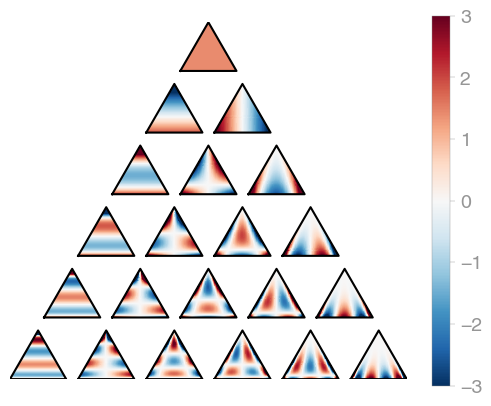
orthopy's triangle orthogonal polynomials are evaluated in terms of barycentric
coordinates, so the
X.shape[0] has to be 3.
import orthopy
bary = [0.1, 0.7, 0.2]
evaluator = orthopy.t2.Eval(bary, "normal")
Disk (S2)
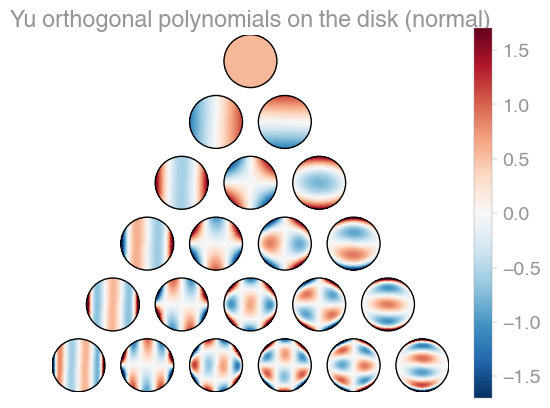 |
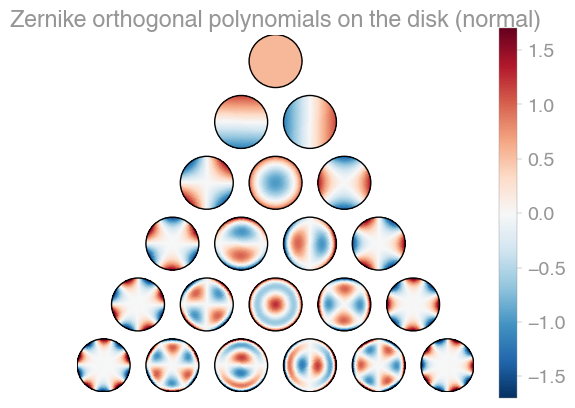 |
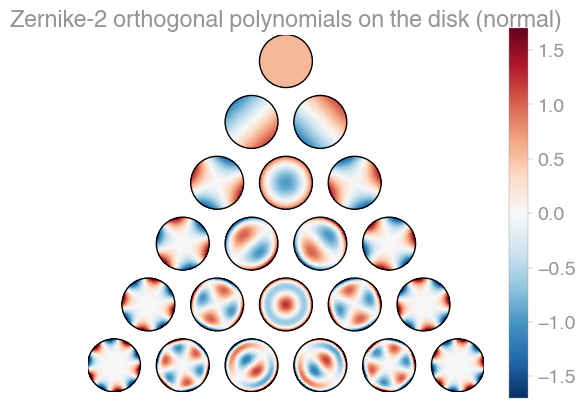 |
|---|---|---|
| Xu | Zernike | Zernike 2 |
orthopy contains several families of orthogonal polynomials on the unit disk: After Xu, Zernike, and a simplified version of Zernike polynomials.
import orthopy
x = [0.1, -0.3]
evaluator = orthopy.s2.xu.Eval(x, "normal")
# evaluator = orthopy.s2.zernike.Eval(x, "normal")
# evaluator = orthopy.s2.zernike2.Eval(x, "normal")
Sphere (U3)
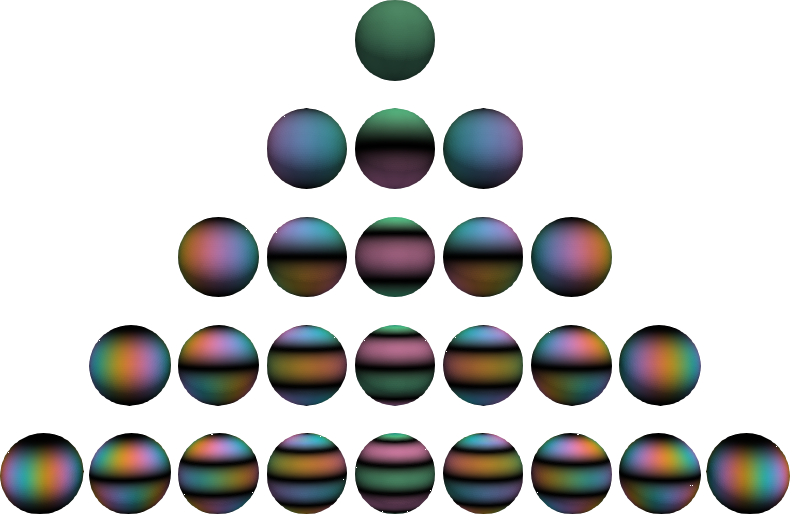
Complex-valued spherical harmonics, (black=zero, green=real positive, pink=real negative, blue=imaginary positive, yellow=imaginary negative). The functions in the middle are real-valued. The complex angle takes n turns on the nth level.
evaluator = orthopy.u3.EvalCartesian(
x,
scaling="quantum mechanic" # or "acoustic", "geodetic", "schmidt"
)
evaluator = orthopy.u3.EvalSpherical(
theta_phi, # polar, azimuthal angles
scaling="quantum mechanic" # or "acoustic", "geodetic", "schmidt"
)
n-Cube (Cn)
 |
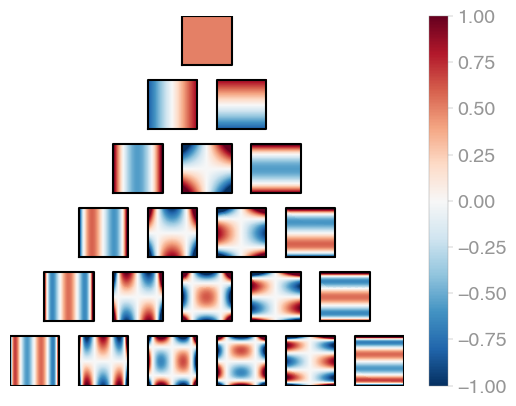 |
 |
|---|---|---|
| C1 (Legendre) | C2 | C3 |
Jacobi product polynomials.
All polynomials are normalized on the n-dimensional cube. The dimensionality is
determined by X.shape[0].
evaluator = orthopy.cn.Eval(X, alpha=0, beta=0)
values, degrees = next(evaluator)
nD space with weight function exp(-r2) (Enr2)
 |
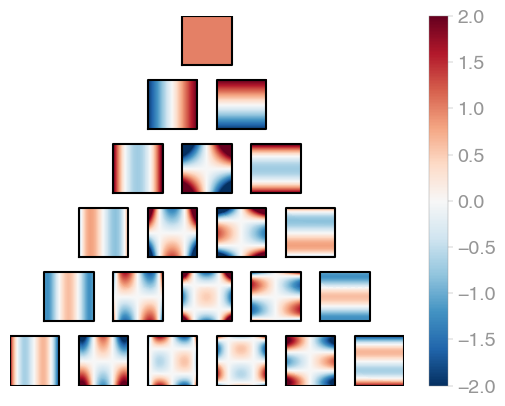 |
 |
|---|---|---|
| E1r2 | E2r2 | E3r2 |
Hermite product polynomials.
All polynomials are normalized over the measure. The dimensionality is determined by
X.shape[0].
evaluator = orthopy.enr2.Eval(
x,
standardization="probabilists" # or "physicists"
)
values, degrees = next(evaluator)
Other tools
-
Generating recurrence coefficients for 1D domains with Stieltjes, Golub-Welsch, Chebyshev, and modified Chebyshev.
-
The the sanity of recurrence coefficients with test 3 from Gautschi's article: computing the weighted sum of orthogonal polynomials:
orthopy.tools.gautschi_test_3(moments, alpha, beta)
-
Clenshaw algorithm for computing the weighted sum of orthogonal polynomials:
vals = orthopy.c1.clenshaw(a, alpha, beta, t)
Relevant publications
- Robert C. Kirby, Singularity-free evaluation of collapsed-coordinate orthogonal polynomials, ACM Transactions on Mathematical Software (TOMS), Volume 37, Issue 1, January 2010
- Abedallah Rababah, Recurrence Relations for Orthogonal Polynomials on Triangular Domains, MDPI Mathematics 2016, 4(2)
- Yuan Xu, Orthogonal polynomials of several variables, arxiv.org, January 2017
Project details
Release history Release notifications | RSS feed
Download files
Download the file for your platform. If you're not sure which to choose, learn more about installing packages.
Source Distributions
Built Distributions
Filter files by name, interpreter, ABI, and platform.
If you're not sure about the file name format, learn more about wheel file names.
Copy a direct link to the current filters
File details
Details for the file orthopy-0.10.4-cp313-none-any.whl.
File metadata
- Download URL: orthopy-0.10.4-cp313-none-any.whl
- Upload date:
- Size: 160.6 kB
- Tags: CPython 3.13
- Uploaded using Trusted Publishing? Yes
- Uploaded via: twine/6.1.0 CPython/3.12.9
File hashes
| Algorithm | Hash digest | |
|---|---|---|
| SHA256 |
d4252581d7198cb566846e459d677010bf14358fce48d7fba78fa06c75399fb5
|
|
| MD5 |
7139a1ce1485cb97e58870323343acb6
|
|
| BLAKE2b-256 |
13e6847a92d21e9120b76723beeb486d8e12a54a173d18e16519d459dc3ffbfd
|
Provenance
The following attestation bundles were made for orthopy-0.10.4-cp313-none-any.whl:
Publisher:
release.yml on sigma-py/orthopy-dev
-
Statement:
-
Statement type:
https://in-toto.io/Statement/v1 -
Predicate type:
https://docs.pypi.org/attestations/publish/v1 -
Subject name:
orthopy-0.10.4-cp313-none-any.whl -
Subject digest:
d4252581d7198cb566846e459d677010bf14358fce48d7fba78fa06c75399fb5 - Sigstore transparency entry: 298206127
- Sigstore integration time:
-
Permalink:
sigma-py/orthopy-dev@0f3405a7f2cec0bd06d3341af26cab532b0d021d -
Branch / Tag:
refs/tags/v0.10.4 - Owner: https://github.com/sigma-py
-
Access:
private
-
Token Issuer:
https://token.actions.githubusercontent.com -
Runner Environment:
github-hosted -
Publication workflow:
release.yml@0f3405a7f2cec0bd06d3341af26cab532b0d021d -
Trigger Event:
release
-
Statement type:
File details
Details for the file orthopy-0.10.4-cp312-none-any.whl.
File metadata
- Download URL: orthopy-0.10.4-cp312-none-any.whl
- Upload date:
- Size: 160.2 kB
- Tags: CPython 3.12
- Uploaded using Trusted Publishing? Yes
- Uploaded via: twine/6.1.0 CPython/3.12.9
File hashes
| Algorithm | Hash digest | |
|---|---|---|
| SHA256 |
4af215c0d3710963dab472ef21a3eb81d600a6ca20b79674ac2207e967474940
|
|
| MD5 |
62a056d0637ee840acf5b83b91fab7a3
|
|
| BLAKE2b-256 |
5bb9f1f55bf8558b8d5e68c8c9fcd289cabada0e9abfc11cf513df8634345254
|
Provenance
The following attestation bundles were made for orthopy-0.10.4-cp312-none-any.whl:
Publisher:
release.yml on sigma-py/orthopy-dev
-
Statement:
-
Statement type:
https://in-toto.io/Statement/v1 -
Predicate type:
https://docs.pypi.org/attestations/publish/v1 -
Subject name:
orthopy-0.10.4-cp312-none-any.whl -
Subject digest:
4af215c0d3710963dab472ef21a3eb81d600a6ca20b79674ac2207e967474940 - Sigstore transparency entry: 298206113
- Sigstore integration time:
-
Permalink:
sigma-py/orthopy-dev@0f3405a7f2cec0bd06d3341af26cab532b0d021d -
Branch / Tag:
refs/tags/v0.10.4 - Owner: https://github.com/sigma-py
-
Access:
private
-
Token Issuer:
https://token.actions.githubusercontent.com -
Runner Environment:
github-hosted -
Publication workflow:
release.yml@0f3405a7f2cec0bd06d3341af26cab532b0d021d -
Trigger Event:
release
-
Statement type:
File details
Details for the file orthopy-0.10.4-cp311-none-any.whl.
File metadata
- Download URL: orthopy-0.10.4-cp311-none-any.whl
- Upload date:
- Size: 179.9 kB
- Tags: CPython 3.11
- Uploaded using Trusted Publishing? Yes
- Uploaded via: twine/6.1.0 CPython/3.12.9
File hashes
| Algorithm | Hash digest | |
|---|---|---|
| SHA256 |
6c2797891434b6045073c9f24a3f5b35c2f9cbd5bc42cf0a71058ac03c355f56
|
|
| MD5 |
34897d2c75ef185f7497eb6243acb046
|
|
| BLAKE2b-256 |
c924f3e2eb094d86bd791d8a4d65feb32ed18bf4cceeb331a50ead48c00d8469
|
Provenance
The following attestation bundles were made for orthopy-0.10.4-cp311-none-any.whl:
Publisher:
release.yml on sigma-py/orthopy-dev
-
Statement:
-
Statement type:
https://in-toto.io/Statement/v1 -
Predicate type:
https://docs.pypi.org/attestations/publish/v1 -
Subject name:
orthopy-0.10.4-cp311-none-any.whl -
Subject digest:
6c2797891434b6045073c9f24a3f5b35c2f9cbd5bc42cf0a71058ac03c355f56 - Sigstore transparency entry: 298206093
- Sigstore integration time:
-
Permalink:
sigma-py/orthopy-dev@0f3405a7f2cec0bd06d3341af26cab532b0d021d -
Branch / Tag:
refs/tags/v0.10.4 - Owner: https://github.com/sigma-py
-
Access:
private
-
Token Issuer:
https://token.actions.githubusercontent.com -
Runner Environment:
github-hosted -
Publication workflow:
release.yml@0f3405a7f2cec0bd06d3341af26cab532b0d021d -
Trigger Event:
release
-
Statement type:
File details
Details for the file orthopy-0.10.4-cp310-none-any.whl.
File metadata
- Download URL: orthopy-0.10.4-cp310-none-any.whl
- Upload date:
- Size: 99.4 kB
- Tags: CPython 3.10
- Uploaded using Trusted Publishing? Yes
- Uploaded via: twine/6.1.0 CPython/3.12.9
File hashes
| Algorithm | Hash digest | |
|---|---|---|
| SHA256 |
2e2481f94e21bad67877eceb8e2bc427e98603834ab110737c84eb926f896ca6
|
|
| MD5 |
48555d37eb879f371b24286ff73a5ec7
|
|
| BLAKE2b-256 |
e27bd3aa5d63620e0f29acbe246ff9c88e63005221db8037877de9c0f7e60356
|
Provenance
The following attestation bundles were made for orthopy-0.10.4-cp310-none-any.whl:
Publisher:
release.yml on sigma-py/orthopy-dev
-
Statement:
-
Statement type:
https://in-toto.io/Statement/v1 -
Predicate type:
https://docs.pypi.org/attestations/publish/v1 -
Subject name:
orthopy-0.10.4-cp310-none-any.whl -
Subject digest:
2e2481f94e21bad67877eceb8e2bc427e98603834ab110737c84eb926f896ca6 - Sigstore transparency entry: 298206143
- Sigstore integration time:
-
Permalink:
sigma-py/orthopy-dev@0f3405a7f2cec0bd06d3341af26cab532b0d021d -
Branch / Tag:
refs/tags/v0.10.4 - Owner: https://github.com/sigma-py
-
Access:
private
-
Token Issuer:
https://token.actions.githubusercontent.com -
Runner Environment:
github-hosted -
Publication workflow:
release.yml@0f3405a7f2cec0bd06d3341af26cab532b0d021d -
Trigger Event:
release
-
Statement type:

















